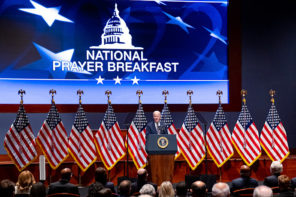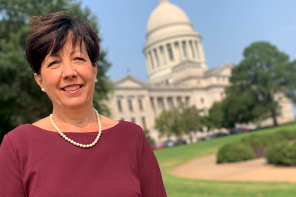There’s an old joke in newsrooms that goes if you can find three examples of something, it’s automatically worthy of a trend story.
And so, according to the rule, it’s too early to call this a trend. Still, it is interesting that two news stories came out yesterday about school districts ending government-endorsed religious observances because they recognize that they would probably lose a costly First Amendment battle.
Could it be that in the wake of the 2005 Kitzmiller v. Dover trial, in which the Dover school district had to pay $1 million in legal fees for trying to force intelligent design into science class in violation of the Constitution, other school districts around the country could be finally paying heed? True, it’s not exactly a victory for reason and sober respect for religious freedom, but, hey, it means that maybe, just maybe, school boards are getting the message that violating the Constitution comes with a hefty price tag.
In northern Indiana, a school district voted to end an elementary school Bible class after their lawyer told them they were bound to lose a lawsuit over its constitutionality.
In Tennessee, after the Freedom From Religion Foundation filed suit on behalf of students, a school district agreed to stop broadcasting prayer over loudspeakers before home football games because the superintendent recognizes that it violates the First Amendment.
In the northern Indiana school district, the Associated Press reports:
“The law is quite clear: Religious instruction for elementary school students on school grounds during the school day is not constitutionally permitted,” said Fairfield Community Schools attorney Tim Shelly.
The American Civil Liberties Union of Indiana sued the district in federal court on behalf of a New Paris Elementary School first-grader and his mother. The suit alleged the boy was left unsupervised in the hallway when his mother opted him out of the weekly 20-minute Bible class. He later was sent to the school library.
The suit said the boy was being deprived of educational instruction during the Bible class and that the class violated the First Amendment.
Shelly warned board members that the district could be forced to pay $100,000 to $800,000 when it inevitably lost. Board members voted 6-0 last week to immediately end the Bible class, drawing boos from a crowd of students, parents and community members who had shown up to speak in support of the program.
In the Chattanooga suburb of Hamilton County, the Times Free Press reports:
After receiving a letter of complaint from the Freedom from Religion Foundation this week on behalf of students from Soddy-Daisy High School, Scales sent an e-mail to all local principals on Tuesday, saying the U.S. Supreme Court had ruled prayer before football games and graduation ceremonies to be unconstitutional and that the practices should be stopped.
“But things are handled a little differently in different areas of the country,” Scales said. “This does not need to be something that divides our community. None of the school cases that have been litigated are designed to keep anyone from praying or exercising their religious freedom.”
Scales said he received plenty of feedback Wednesday, mostly from people upset over the public prayer ban.
“I would [expect] that because it’s a part of the culture here, it’s a part of the landscape,” he said. “That’s probably one of the reasons it has not been addressed publicly by the school administration or the school board in the past, because it was so widely accepted. No one exercised the right to protest.
“Now that it has happened, we all know what the laws are, so we have to make sure we’re doing what’s right,” he said.
As always, it’s important to note that the districts’ decisions don’t take away a student’s right to pray. As Barrie Lynn of American’s United for Separation of Church and State says, “As long as there are algebra tests, there will be prayer in school.”




